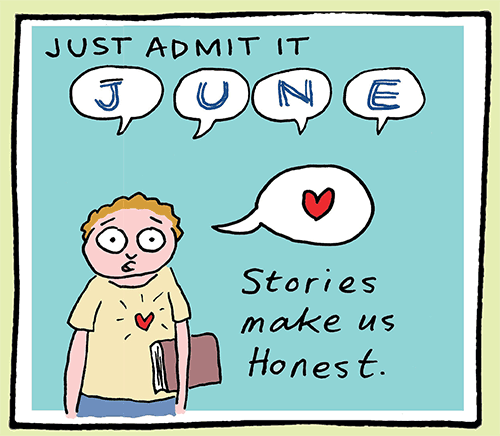
Just-Admit-It June:
Stories Make Us Honest

Welcome to Just Admit It June, that time of year when we turn our minds to one of the most fascinating aspects of stories – the way their exciting unexpected dreamboat tendrils of shimmering invention are always coiled around nuggets of truth.
So many truths waiting to be discovered as we read – in stories, in characters and in ourselves.
You can’t solve a problem in a story or in real life without discovering the truth about what’s causing the problem. This usually involves research, those fact-finding, number-crunching, idea-gathering, surface-penetrating skills that authors can’t do without.
And neither, it turns out, can characters. The most gripping and interesting problems in stories are always the big ones that exist way outside the previous experience of the characters facing them. That’s why, if at all possible, I equip my characters with library cards, conversation skills, the ability to crawl long distances through airconditioning ducts, and an aptitude for list-making.
Being brave and smart at asking questions helps too. Including the toughest question of all. Am I causing, or contributing to, the problem? Ew, don’t like that one. But often it has to be asked, which is why sensible characters try to keep open minds and at least listen to the opinions of friends and pets.
Limpy the cane toad in my book Toad Rage has to take a deep breath and be honest with himself. In his quest to get humans to like cane-toads, he starts out thinking the problem is only skin-deep. But after a traumatic experience inside a pair of colourful underpants trying to convince people he’s a butterfly, he takes the plunge and sets out to better understand humans, and himself.
Very rarely, as Limpy reminds us, do heroes in stories win through by lying to themselves.
So is the Laureate Calendar stretching the truth with its bold claim that stories make us honest? I think that’s for each of us to decide. Have a think about some of your reading experiences and see how the claim stacks up for you. As you ponder, you might like to ask yourself these questions …
Have I read a story where the main character is helped more by what they learn about themselves than by what they learn about others? How did I feel about that?
How about a story where readers discover more true things about the main character than the character discovers about themselves? Like it? Don’t like it? Want to give the character a shake?
Should characters pursue the truth at all costs. Always? No matter what? Even if it gives them a painful skin condition? Or hurts a friend? Or kills them both?
If stories are always about truth, what’s going on when we tell ourselves stories to avoid some of the truths in our lives?
When I do research, do I hope to find what I’m looking for, or what I’m not looking for?
Am I getting fed up with questions like these and starting to think they suck? Be honest.
Happy reading and writing, questioning and truth-wrangling,

